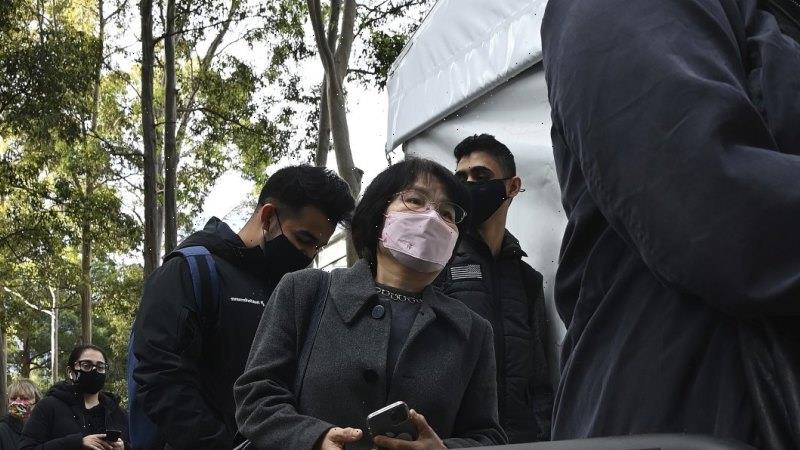For our free coronavirus pandemic coverage, learn more here.
I have looked on with dismay at the naked self-interest and holier-than-thou rhetoric on display in Australia over the past week, particularly out of national cabinet.
The Australian National Immunisation Conference (held in late June, as the Delta crisis was unfolding) heard from Canada that the risk of severe disease to younger adults in the highest COVID-19 incidence areas was higher than for older adults in lowest incidence areas.
A queue for COVID-19 vaccinations at Olympic Park in late June.Credit:Kate Geraghty
Yet in Australia, we have leaders from regions with almost zero COVID-19 cases, let alone severe disease, unwilling to temporarily divert vaccine doses for younger people to south-west Sydney, where high risks of severe disease coexist with high levels of disadvantage.
How is this any different to the much-criticised failure of rich countries to make vaccines available to less advantaged countries where COVID-19 is raging?
In the vaccine era, risk of illness requiring hospitalisation (or especially ICU treatment) due to COVID-19 is almost entirely restricted to the unvaccinated. Even the very old or frail, if vaccinated, are well protected against severe disease. The laser focus of the “retrospectoscope” is trained on what – in the midst of the Sydney Delta outbreak – now looks like “excessively cautious” advice from the Australian Technical Advisory Group on Immunisation.
Yet ATAGI – which includes consumer representatives, not only technical experts – consistently said its assessment of the AstraZeneca vaccine was judged against risk scenarios (even Britain advised mRNA vaccines in under 40s) and noted that these could change.
Queensland Premier Annastacia Palaszczuk, NSW Premier Gladys Berejiklian, WA Premier Mark McGowan and Victorian Premier Daniel Andrews have been reluctant to donate vaccines to other states.Credit:Graphics
As highlighted by ABC’s Media Watch, misleading sensationalism about the risks of the AstraZeneca vaccine was undermining public confidence long before ATAGI’s statement. More recently, this alarmism reached new depths of misinformation through two well-known epidemiologists: Alan Jones and Craig Kelly.
Before safety concerns arose, unjustified commentary stated AstraZeneca was an inferior vaccine – whereas it is one of the most effective vaccines the world has available.
Many of these arguments were predicated on ambitions to achieve herd immunity similar to measles in Australia – where high vaccination rates have eradicated home-grown measles viruses, even if measles viruses from overseas still cause outbreaks.
Effective COVID-19 vaccines, just like other effective vaccines, do reduce transmission, but the Delta variant may well have reached “peak fitness” from the virus point of view – meaning maximum ability to transmit.
With Delta’s much higher infectiousness, population vaccine coverage would likely need to reach an unachievable 97 per cent or greater to stop all infections in a way comparable to measles. But this is a down-the-track issue.
The good news is that “real life” data from England, Israel and Canada show that both the Pfizer mRNA and the AstraZeneca adenovirus vector vaccines provide about 95 per cent protection against hospitalisation or ICU admission, even after a single dose.
This makes the immediate priority to get as many first doses of either Pfizer or AstraZeneca into as many arms as fast as possible.
Although the second dose substantially improves protection against any Delta infection, it adds very little to protection against severe disease and can be delayed as long as needed to maximise first doses.
With time and effort, assisted by Sydney’s Delta wake-up call to Australia, England has shown us that high vaccine coverage – 95 per cent in over 70s and more than 80 per cent in everyone over 18 years – is possible. Once that is achieved, governments can take the focus away from chasing every case at vast cost, secure in the knowledge that even if the Delta strain of COVID-19 is circulating in Australia – which it certainly will – it won’t cause substantial severe illness in a highly vaccinated population, though milder breakthrough infections will occur.
Peter McIntyre is a former director of the National Centre for Immunisation Research and Surveillance, a professor at the universities of Sydney and Otago and sits on the World Health Organisation’s strategic advisory group of experts for vaccines.
The Morning Edition newsletter is our guide to the day’s most important and interesting stories, analysis and insights. Sign up here.
Most Viewed in Politics
From our partners
Source: Read Full Article


